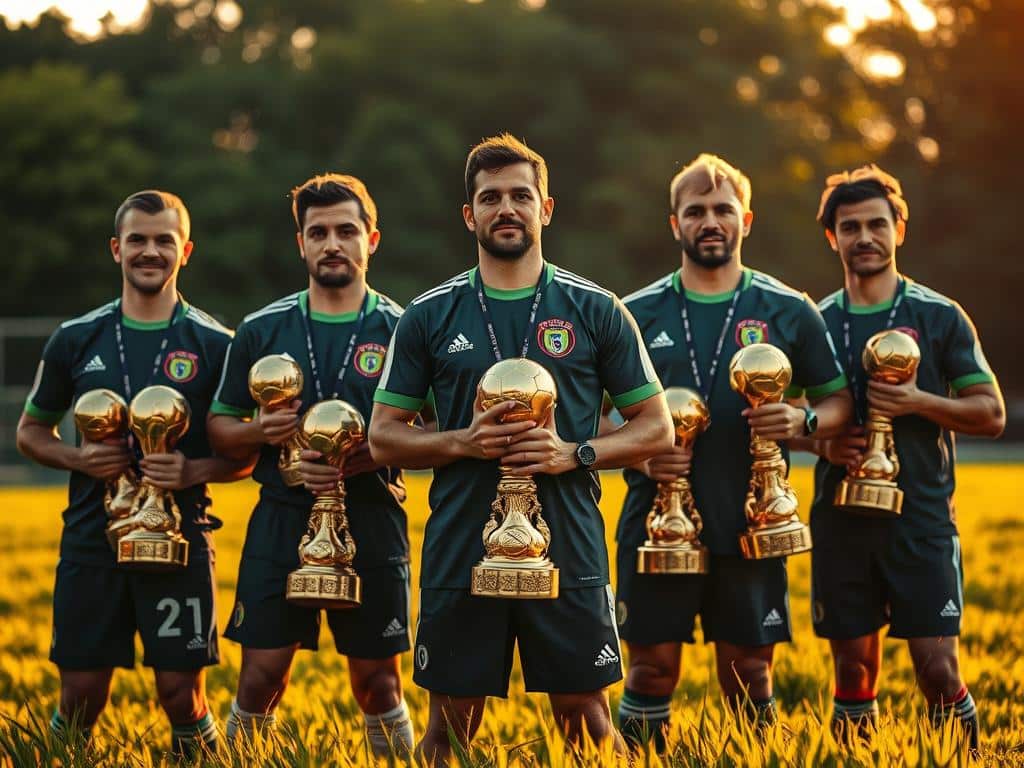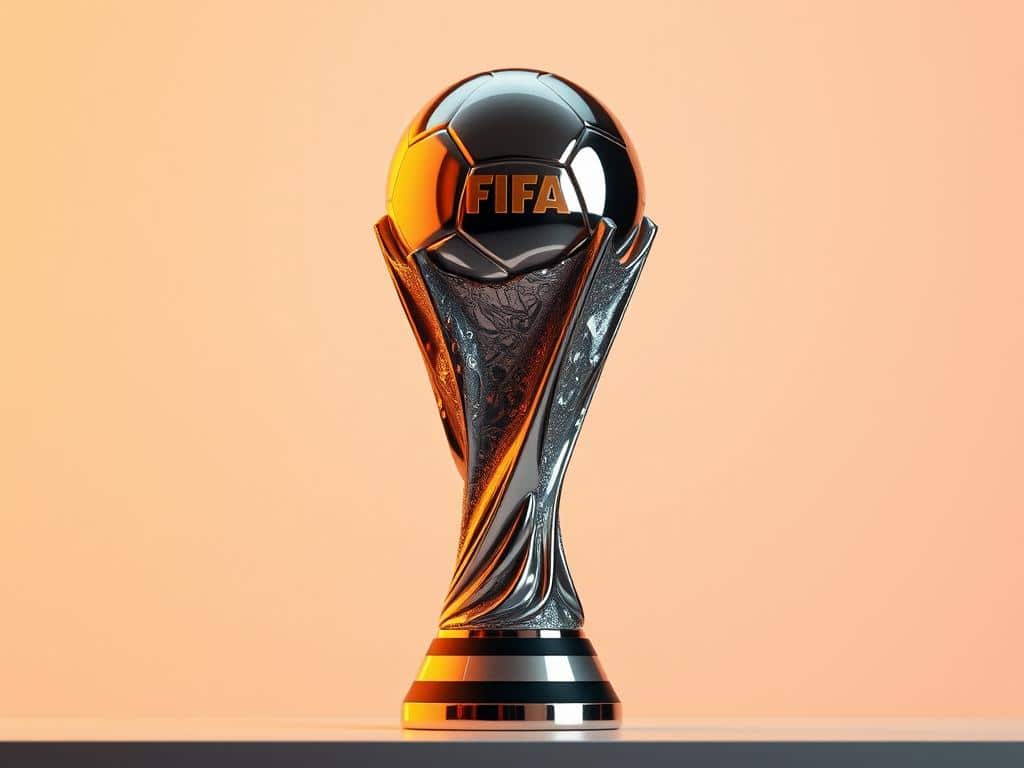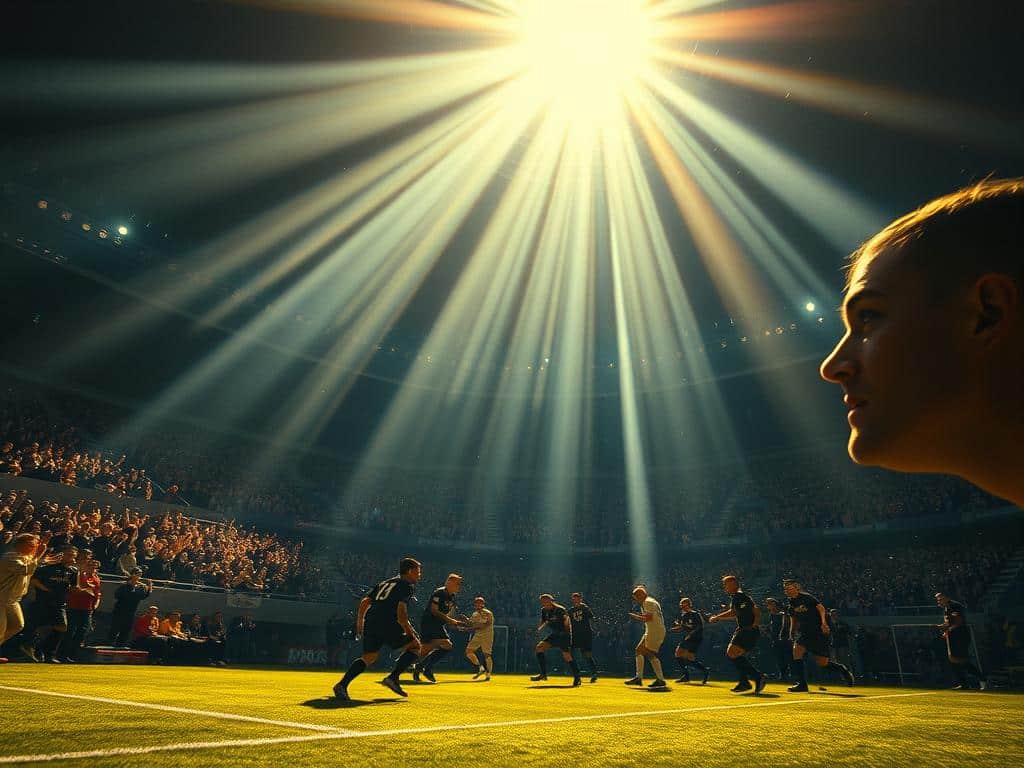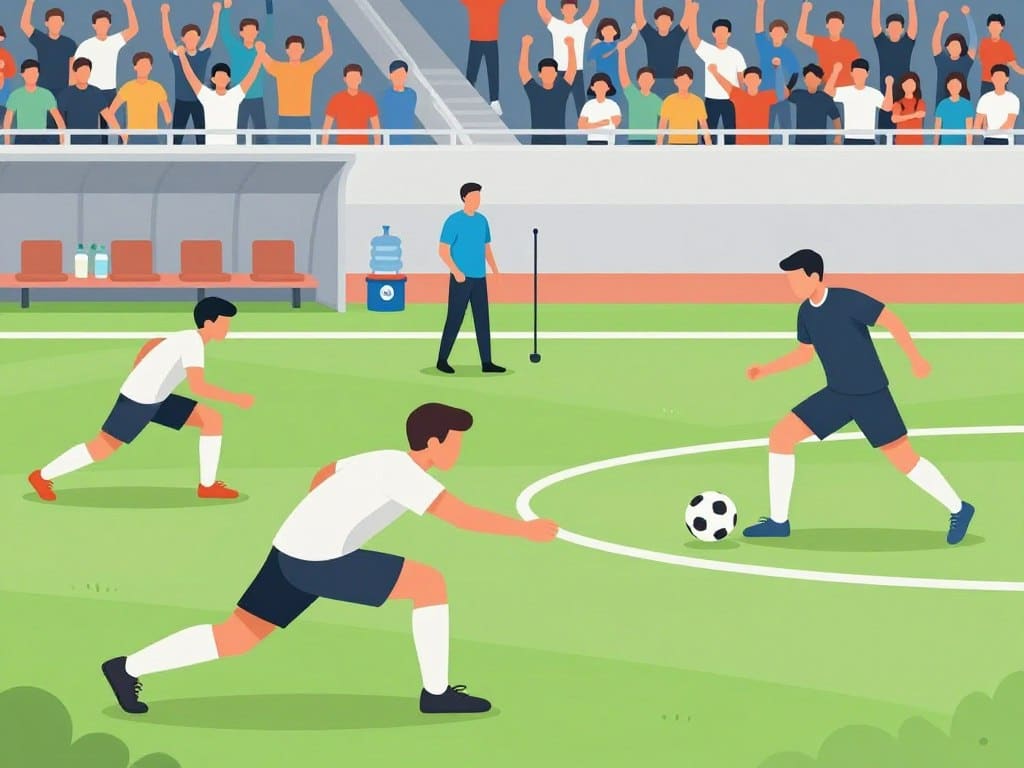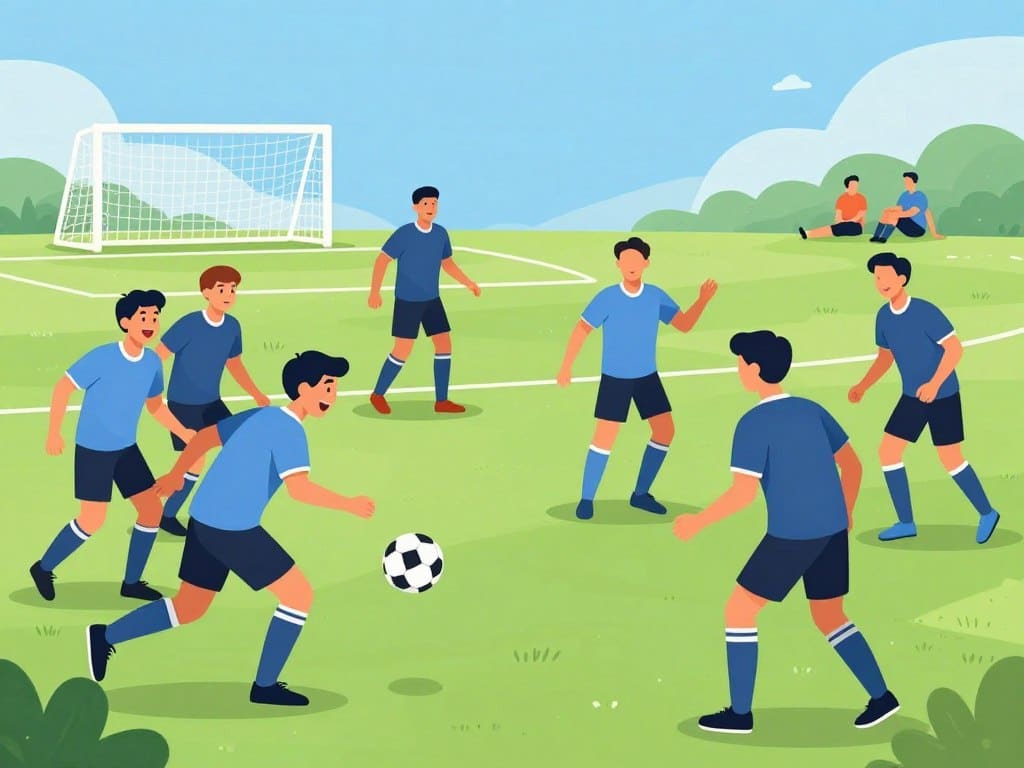Ever wondered who the best goal scorers in soccer history are? The race for the European Golden Boot has seen legends like Lionel Messi, Cristiano Ronaldo, and Robert Lewandowski dominate the pitch. These players didn’t just score—they rewrote the record books.
Messi holds the record with six wins, while Ronaldo boasts four. Lewandowski crushed it with back-to-back victories for Bayern Munich. Even the Premier League has its heroes, like Thierry Henry, who claimed the trophy twice with Arsenal.
From historic legends to modern stars, this award celebrates the game’s fiercest scorers. Ready to dive into their stories? Let’s kick off!
What Is the European Golden Boot?
Why do some players win the Golden Shoe with fewer goals? The answer lies in the award’s unique point system. Officially called the European Golden Shoe, it only counts top-division league goals, ignoring cups or international matches.
Since 1996, goals in tougher leagues like the Premier League or La Liga earn 2 points each. Weaker leagues get 1.5 or 1 point per goal. That’s why Erling Haaland’s 36 goals for Manchester City beat a player with 40 in a smaller league.
Here’s what else makes this award special:
- It’s nicknamed both “Boot” and “Shoe”—same trophy, different terms.
- Champions League goals don’t count, despite what some fans think.
- In 1994, a Welsh striker won with 43 goals for tiny Porthmadog!
Unlike the World Cup’s football Golden Boot (total goals, any stage), this prize rewards consistency in domestic leagues. Though tracked since 1968, today’s weighted system started in 1996. Next, let’s explore its history.
The History of the European Golden Boot
The story behind the European Golden Boot is as thrilling as the goals themselves. Let’s rewind to 1968—when goals ruled everything. Back then, the award simply went to the top scorer in leagues, no fancy math needed.
Portugal’s Primeira Liga dominated early, producing seven winners. Legends like Eusébio set the standard. But by the 1990s, things got messy. Cypriot strikers piled up goals in weaker competitions, sparking debates.
In 1991, Yugoslavia’s Darko Pančev won with Red Star Belgrade—the last victor under the old rules. Then came a five-year gap. No official awards were given until 1996, when UEFA introduced the weighted system we know today.
Why the change? Smaller leagues had an unfair edge. Now, goals in top football divisions count double. The shift balanced the field, making stars like Ronaldo and Messi true kings of consistency.
Fun fact: In 1995, an Armenian club, Pyunik Yerevan, somehow topped the charts. That oddity helped push for reforms. From Eusébio to Van Basten to modern heroes, this trophy’s history proves one thing—great scorers never fade.
How the Golden Boot Point System Works
Not all goals are created equal in the race for the Golden Boot. The award’s system gives extra weight to strikes in tougher leagues, making every goal a strategic battle.
- Top five leagues (England, Spain, Germany, Italy, France): 2 points per goal.
- Leagues ranked 6–22 by UEFA: 1.5 points.
- All others: 1 point.
That’s why Robert Lewandowski’s 41 Bundesliga goals (82 pts) beat Mario Jardel’s 42 in Portugal (63 pts). The system rewards consistency in elite competitions.
UEFA updates league rankings every 5 years using club performance metrics. In 2004, Portugal’s Liga was in the top five—now it’s France’s Ligue 1.
Could the rules change? Fans debate including cup goals, but for now, only league strikes count. One thing’s certain: the math keeps the race thrilling!
Top European Golden Boot Winners of All Time
Scoring goals is hard, but these legends made it look easy. With razor-sharp precision and relentless consistency, they turned leagues into their personal highlight reels. Here’s a closer look at the most dominant scorers in soccer history.
Lionel Messi: The Record Holder
Lionel Messi didn’t just win the award—he owned it. Six trophies cement his status as the greatest. His 2011–12 season? Unreal. Fifty goals in 37 La Liga games (100 points) set a benchmark even rivals admire.
Fun fact: Messi’s 2012 run included four hat-tricks. Opponents knew what was coming but still couldn’t stop him.
Cristiano Ronaldo: The Ultimate Competitor
If Messi was poetry, Cristiano Ronaldo was a thunderbolt. His 2014–15 campaign for Real Madrid delivered 48 goals in 35 appearances. Four wins prove his adaptability across leagues.
Their rivalry pushed both to new heights. While Messi leads in trophies, Ronaldo’s aerial dominance and power shots added flair to the race.
Robert Lewandowski: The Modern Machine
No striker today matches Robert Lewandowski’s efficiency. His 41-goal Bundesliga record (2020–21) earned 82 points. Back-to-back wins with Bayern Munich showcased his clinical finishing.
Even at 35, he’s breaking records—proof that age is just a number for elite scorers.
Thierry Henry: Premier League Icon
Thierry Henry brought elegance to the Premier League. Arsenal’s 2003–04 “Invincibles” season featured his 30-goal masterclass. He’s the only player to win consecutive EPL Golden Boots.
Quick, clever, and unstoppable—Henry redefined what a forward could be.
Honorable mention: Luis Suárez’s 40-goal 2015–16 season for Barcelona. Yet, legends like Ruud van Nistelrooy never topped the list—a reminder of how fierce this competition truly is.
Notable European Golden Boot Winners from Lesser-Known Leagues
Some of soccer’s most incredible scorers came from leagues you might not expect. Before the 1996 rule changes, players from smaller competitions often topped the charts with jaw-dropping numbers.
Dudu Georgescu ruled Romania’s Liga I in the 1970s. His back-to-back wins (1975-77) for Dinamo Bucharest included a 47-goal season that still stands as a national record.
Scotland’s Ally McCoist bagged 34 goals for Rangers in 1992-93. His clinical finishing proved the Scottish Premier League could produce world-class scorers.
Portugal’s Fernando Gomes dominated with Porto in the 1980s. His 39-goal 1984-85 campaign showed why he’s considered one of Europe’s deadliest strikers.
Other unforgettable performances:
- Nikos Machlas’ 34 goals for Vitesse Arnhem (1997-98) set a Dutch Eredivisie record
- Darko Pančev’s 34 strikes for Red Star Belgrade (1990-91) helped them win the European Cup
- Zviad Endeladze’s 40 goals in Georgia (1996) marked the last win before league weighting
These players proved greatness isn’t limited to big leagues. Though rule changes made such wins rare, their legacies endure as proof that talent emerges everywhere.
Golden Boot Winners by Nationality
Which countries produce the most lethal strikers in European leagues? The answer might surprise you. While Argentina and Portugal lead with seven wins each, smaller nations like Wales and Georgia have left their mark too.
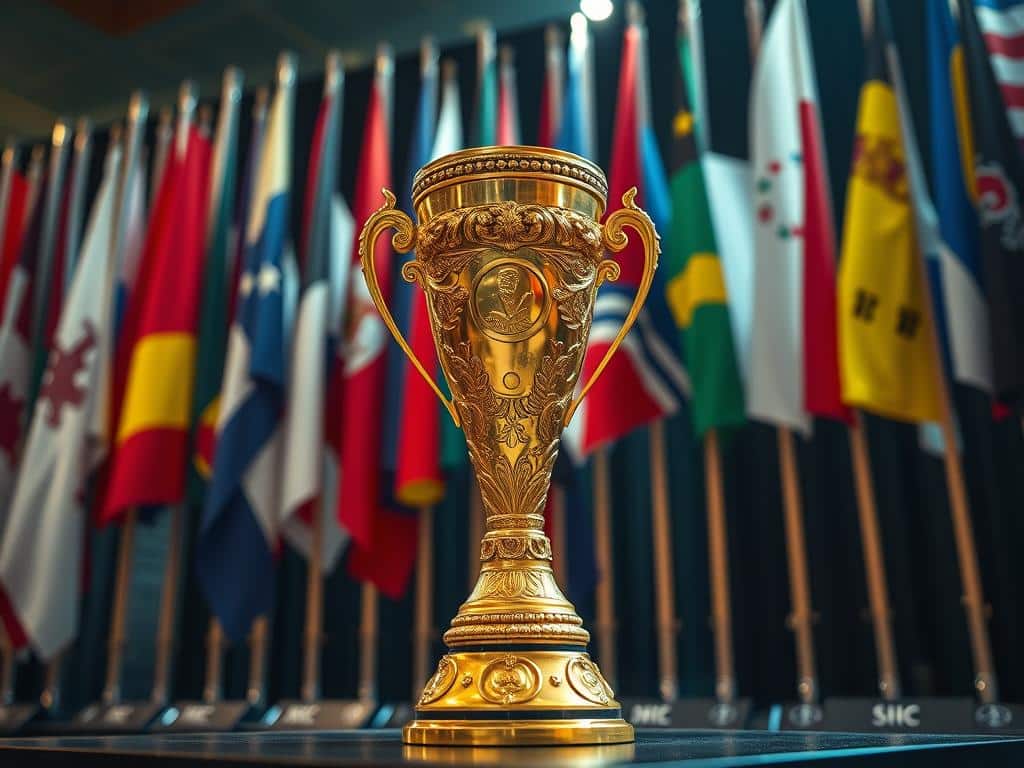
Argentina’s dominance comes mainly from Lionel Messi’s six trophies. The seventh? José Sanfilippo’s 1959 win with San Lorenzo. Meanwhile, Portugal boasts a deeper spread:
- Eusébio’s back-to-back wins (1968, 1973)
- Cristiano Ronaldo’s four victories
- Fernando Gomes’ two triumphs with Porto
The Netherlands claims four wins, thanks to Marco van Basten and others. France follows closely, powered by Thierry Henry’s back-to-back seasons with Arsenal.
Some unexpected winners stand out:
- Bulgaria’s Petar Zhekov (CSKA Sofia, 1969)
- Wales’ Ian Rush (1984) and David Taylor (1994)
- Yugoslavia’s Darko Pančev (Red Star Belgrade, 1991)
Recently, Poland joined the club through Robert Lewandowski’s dominance. Who’s next? Norway’s Erling Haaland and England’s Harry Kane look poised to add their nations to this elite list.
From established powers to underdog stories, this award proves great scorers emerge everywhere. The next record-breaker could come from anywhere—that’s the beauty of soccer.
Clubs with the Most Golden Boot Winners
Behind every great scorer stands a club that helped them shine brightest. Some teams have become true factories for developing lethal strikers. Let’s explore the clubs that consistently produce soccer’s most dangerous finishers.
Barcelona leads with eight winners—more than any club. Lionel Messi accounts for six of those trophies, while Luis Suárez and Ronaldo Nazário claimed one each. Their attacking philosophy creates perfect conditions for goal machines.
Germany’s Bayern Munich has three winners, including Robert Lewandowski’s back-to-back triumphs. Gerd Müller set the standard in the 1970s, proving their striker development system works across generations.
Real Madrid matches Bayern with three victories. Cristiano Ronaldo won twice in white, while Hugo Sánchez dominated in the 1980s. Their Galácticos approach attracts world-class finishers.
England’s Arsenal owes both wins to Thierry Henry’s magic. Meanwhile, Liverpool saw Ian Rush and Luis Suárez etch their names in history. Both clubs show the Premier League’s scoring pedigree.
Other clubs with multiple winners:
- Porto: Fernando Gomes and Mario Jardel
- Ajax: Marco van Basten and Wim Kieft
- Dinamo București: Three Romanian-era winners
Recently, Lazio’s Ciro Immobile joined the list. With Erling Haaland at Manchester City, we might see new clubs enter this elite group soon. The race to develop soccer’s deadliest strikers never stops!
Modern Era Dominators (2000-Present)
Modern soccer thrives on strikers who redefine scoring standards every season. While legends like Messi and Ronaldo set the bar, today’s stars are shattering expectations with jaw-dropping consistency.
Kylian Mbappé: Ligue 1’s Finest
Kylian Mbappé dominates France with blistering speed. His 40-goal 2022-23 season earned 80 points—just shy of the award. PSG’s star proves you don’t need trophies to be legendary.
Harry Kane: From Tottenham to Bayern
England’s Harry Kane adapted instantly to Germany. His 36-goal debut with Bayern Munich showcased world-class versatility. Back-to-back hat-tricks? Just another week for this clinical finisher.
Ciro Immobile: Serie A’s Silent Assassin
At Lazio, Ciro Immobile quietly racks up goals. His 36-strike 2019-20 season earned Italy’s Capocannoniere honor. Four scoring titles prove he’s Serie A’s most consistent threat.
How do modern stars compare?
- Manchester City’s Haaland: 36 goals in 2023-24 (record pace)
- Salah’s 32-goal 2017-18: 64 points—proof Premier League is tougher
- 90s scorers had fewer games but higher per-match averages
Keep an eye on Jude Bellingham. The midfielder’s 20-goal Real Madrid start hints at a future challenge. One thing’s clear—today’s attackers are rewriting the rules.
Memorable Golden Boot Seasons
Some soccer seasons stand out as pure magic—when strikers turned every match into a highlight reel. These campaigns didn’t just win the award; they redefined what’s possible.
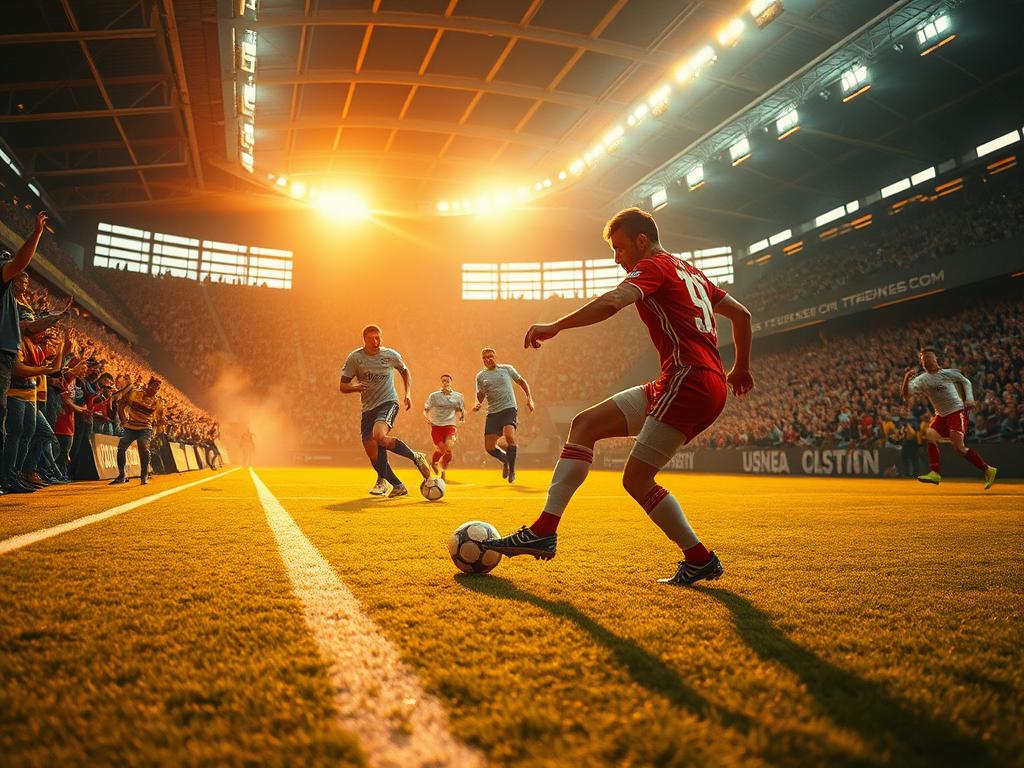
Let’s revisit Messi’s 2011-12 masterclass first. Fifty goals in 37 La Liga games? That’s a hat-trick every 7 matches. His precision was jaw-dropping.
Ronaldo answered in 2014-15 with 48 strikes for Real Madrid. The league had no answer for his power and aerial dominance. He scored in 12 straight games—pure consistency.
For sheer volume, few match Dudu Georgescu’s 1976-77 run. His 47 goals for Dinamo Bucharest still echo through Romanian soccer history.
Marco van Basten’s 1986-87 Eredivisie season deserves attention too. Thirty-seven goals for Ajax showed why he’d become a global icon.
Modern fans remember Lewandowski breaking Gerd Müller’s record in 2020-21. Forty-one Bundesliga league goals proved his clinical finishing.
Other legendary campaigns:
- Suárez’s 40-goal farewell at Barcelona (2015-16)
- Jardel’s 42-goal Primeira Liga rampage (2001-02)
- Haaland’s 36-goal Premier League debut (2022-23)
These weren’t just good seasons—they were historic art shows where the net was the canvas.
The Future of the European Golden Boot
The race for soccer’s top scorer award is evolving faster than ever. Young players like Erling Haaland and Kylian Mbappé are rewriting the rules, while debates about the system itself heat up. Let’s explore what’s coming next.
Haaland could realistically challenge Messi’s record. At just 23, he’s already won twice. With his Manchester City form, six trophies aren’t out of reach. Mbappé (25) and rising star Rasmus Højlund (21) add fierce competition.
UEFA’s coefficient changes will shake things up. Leagues like Portugal’s might regain top-tier status, while others could drop. This directly impacts how goals are weighted in the future.
Could we see MLS or Saudi Pro League included? As these leagues attract big names, their goals might soon count. The debate rages about whether they deserve equal footing with traditional powerhouses.
Young guns to watch:
- Benjamin Šeško (RB Leipzig) – Towering presence
- Endrick (Real Madrid) – Brazilian wonderkid
- Evan Ferguson (Brighton) – Premier League’s next star
Should assists or expected goals (xG) factor in? Modern football values playmaking as much as finishing. Adding these metrics could revolutionize how we crown scoring champions.
Women’s football integration seems inevitable. With growing visibility, a parallel award for female players would celebrate their achievements too. The NWSL and WSL produce world-class scorers daily.
AI tracking could eliminate controversies. Imagine cameras calculating goal probabilities in real-time. No more disputes about deflections or own goals—just pure data.
One thing’s certain: the future of scoring honors will be as thrilling as the goals themselves. Who’ll rise? What rules will change? Stay tuned—the next era begins now.
Celebrating Soccer’s Greatest Scorers
Every goal tells a story—these players wrote entire chapters. From Eusébio’s 1968 breakthrough to Thierry Henry’s Arsenal heroics, the football world thrives on their brilliance.
Marvel at Messi and Ronaldo’s decade-long duel. Applaud Lewandowski’s Bundesliga dominance at 35. Even unsung stars like Vitesse’s Nikos Machlas left their mark.
Today’s races—Haaland vs. Mbappé—carry the torch. Their hunger mirrors the legends before them. Because in soccer, goals don’t just win games. They define legacy.
So keep watching. The next record-breaker is already writing history.

